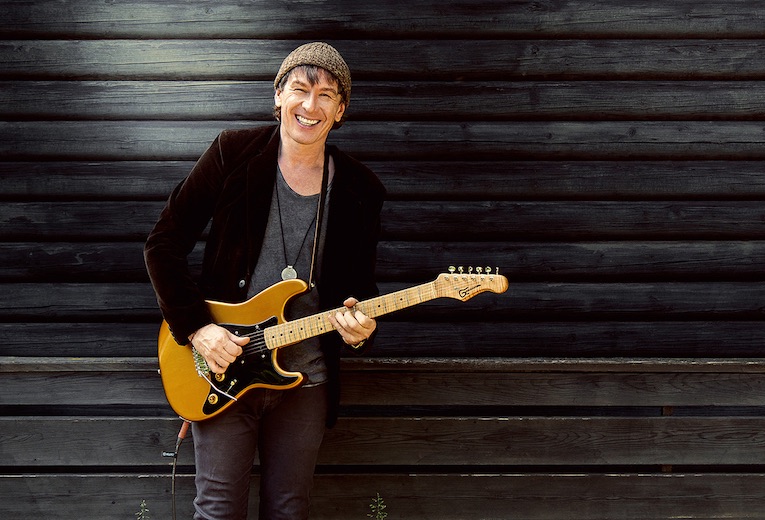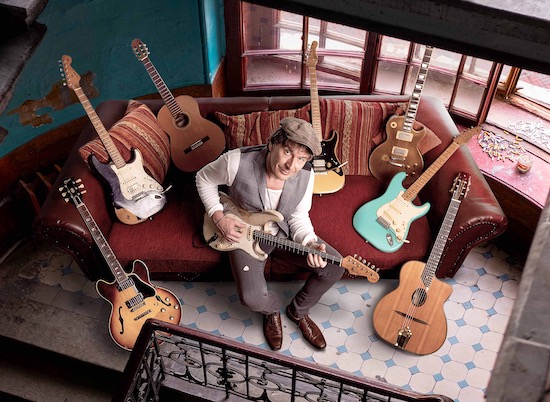
Marcus Deml
By Martine Ehrenclou
Born in Prague, world class guitarist Marcus Deml grew up in Austria and Germany. After moving to the U.S., he studied at the Guitar Institute of Technology in Los Angeles and two years later began teaching there. As a tour and session guitarist, he worked with Carmine Appice, Randy Jackson and more. After five years his residence permit expired and he returned to Europe.
In the following years, Deml evolved into a sought-after session and live musician with over 300 sessions to his name, including work for Kingdom Come, Toto singer Bobby Kimball, German superstar Nena, Rick Astley, Snap and Laith Al-Deen. He has also toured with Saga, German Hip-Hop Project Rödelheim Hartreim and Phil’s son Simon Collins and more.
Marcus released five studio albums with Errorhead, producing and writing all the songs. He received a Guitar Hero Award at the Rock & Roll Hall of Fame in Cleveland in 2005 by Guitar Player magazine. After taking a break from touring with Errorhead in 2015, Marcus returned to his musical roots and formed The Blue Poets, a high energy blues/rock group, with Australian- born singer Gordon Grey, drummer Felix Dehmel and bassist Markus Setzer.
Marcus released his all-instrumental solo album, Healing Hands on November 26, 2021 via Triple Coil Music.
Martine Ehrenclou: Healing Hands is a beautiful instrumental album. You wrote, recorded and produced it during the pandemic. Tell me how that process unfolded and how it came about.
Marcus Deml: This is what happens if you turn your worries into inspiration. It’s Friday the 13th, 2020, and I know I’m going to lose two tours. Five minutes of panic turned into almost a year of creative freedom and total happiness. Every morning I went to the office (my home studio) and started to record the melodies that I had collected in my head. Then I started to experiment with different rhythmic and harmonic structures while maintaining these melodies.
Martine: Your album has a variety of musical styles. Was that planned or did you record many songs and then chose the tracks? What was your goal with Healing Hands?
Marcus: Nothing was mapped or planned. It was the 15-year-old me. No stylistic boundaries, no restrictions, just a musician with ideas and no time limit. I did record more tunes, but I selected these 10 songs, because I wanted a flow from beginning to end, even though that might be a bit old school in the streaming age.
Martine: Along with guitar, did you play the other instruments yourself on Healing Hands or did you bring other musicians in?
Marcus: I recorded everything myself, then I mixed it so it sounded like a record. After about six months, I started to replace my bass, keyboard and drum tracks with the specialists. Rallf Gustke (drums) Arnd Geise (bass) Tom Aeschbacher (keys) Frank Meiller (clarinet.) These guys are world class musicians and since they have played with the best, they not only play perfectly and are fast, but they also provided some input.
Then I mixed it again myself. I decided that I should have an unbiased opinion on everything and brought in my old friend from the Kingdom Come days, Kai Fricke and mixed it at his studio, while I turned into the annoying producer yelling from the couch. (Laughs)
Martine: “Querida” is beautiful. Tell me about the song.
Marcus: I always write birthday or Christmas tunes for special people. This one is for the love of my life. I love writing like that, because then I get into different state of mind. On the first version, it was all acoustic, but I decided that I can express myself better with my old Strat.

Martine: What does the album title Healing Hands mean to you?
Marcus: I realized (once again) that I have a gift that not only feeds me, but also takes most of my troubles away. I wanted to share that feeling. I truly believe in the healing power of music, and a lot of people seem to get comfort and hope through this album, which makes me extremely happy.
Martine: In your press information, it states, “Every note, every lick, every solo has its exactly timed function.” Please explain.
Marcus: That is wishful thinking but I want every note to have a meaning. It needs a colour, an inflection to express that meaning. It doesn’t matter if I play a few notes or go into faster playing. The guitar’s common problem is that you easily can rely on muscle memory. In that case, the instrument is playing you and not vice versa.
Martine: “Si Senor” is a killer track. Who are your Latin guitar influences? How did you arrive at writing this particular song? Who played drums and percussion?
Marcus: I was listening to a Santana concert from the 70s and was blown away by the spirit of Carlos and the whole band. “Si Senor” is really a tribute to him. Three seconds of Carlos and you know it’s him. I did not copy him, but tried to catch his vibe. I hope he hears it. Ralf Gustke (drums) has played with everybody in this world. He is like the European Vinnie Colaiuta, and he is responsible for all the insane percussion and drumming. Other than that, I do not know anything about Latin music other than playing Blue Bossa.
Martine: Tell me about the process of going into the studio, writing, producing every day during the pandemic. How did it serve you personally during the pandemic?
Marcus: I just had the time since I was not on the road or giving guitar clinics. It is something that I truly enjoy and don’t have to force. I just need an empty calendar and a digital diet. It is easy for me to work 12-hour days in the studio. I can spend 3 days on a song without stopping, only to throw it away or start from scratch.
Martine: Tell me about your guitars. I’ve seen you play Strats. You must have others. Which guitars did you use on Healing Hands? What about your song “La Gitana” which guitars on this one?
Marcus: All the guitar and amp combinations and pedals are in the Digipack booklet of the CD, and we have just released a 60-page hardcover book called, ‘Healing Hands -The Guitars’ for all the lovely nerds. I have way too many instruments, but I would not consider myself a collector. I started to give away a few to people who can’t afford a good instrument. On “La Gitana” I’ve used a 69′ Gibson ES-335 called Larry, because I always wanted one like Larry Carlton since I took a guitar lesson from him many moons ago. I also used a hand built Selmer style acoustic by a Luthier called Roeder.
Martine: You’re known as a guitar virtuoso and versatile guitarist. Who are your guitar influences?
Marcus: I started with Hendrix and Blackmore as a little boy. Then I got into B.B King and Albert Collins. By the age of 15 I had the wrong friends (laughter) and got into jazz (George Benson, Wes Montgomery.) Later the Fusion thing with McLaughlin, Di Meola and Holdsworth. When I lived in L.A. I studied all the great session players, because I really wanted to do that for a living.
Martine: How did you start playing guitar? Do you come from a musical family?
Marcus: My mom is a singer, not professionally, but she was always singing with this angel-like voice. My dad was completely non-musical and always hated everything I did, ‘till I wrote a Gypsy Jazz tune for him called ‘Tata’ on the Modern Hippie album. I have always loved the guitar since the age of eight. I started seriously practicing for a few hours every day when I was 12 years old. Being a foreigner with fire red hair in Germany, I had a lot of time. (Laughter)
All of my friends were playing an instrument. Saxophone, piano, guitar, bass and drums. We had our first band six weeks after I bought my first guitar, playing some Hendrix and T-Bone Walker. Many of my school band buddies turned into well-known professionals in every kind of musical style. My grandmother had a hotel in Salzburg, Austria, where all the great conductors and opera singers were staying, so I got an impression of opera and classical music, but of course I didn’t like the classical life style.
Martine: Are you still recording/performing with The Blue Poets?
Marcus: Right now I am overwhelmed with the success of Healing Hands and it takes all of my attention. Since I also run my own record company, Triple Coil Music, there is a lot of office work involved, which gives me reason to get up very early, to get in a few hours of playing. 2021 is completely different from last year. It is music business every day. I am involved in every aspect of my own brand, the artwork the marketing etc.
We are planning another release called Marcus Deml – Guitar Instrumentals Vol.1 since there is a large catalog. Also, I am getting more into the video world, trying to produce better videos. I’m almost finished another album with the Jazz/Rock group Electric Outlet, which is very technically demanding stuff, so I am taking my time with that.
Unfortunately there are no touring plans right now since we pretty much have another lockdown in Europe.
Watch “Immigrant Blues”
For more information on Marcus Deml see his website here

Leave A Comment